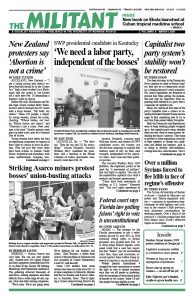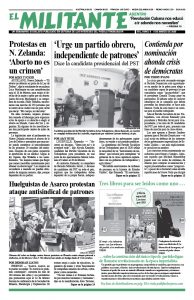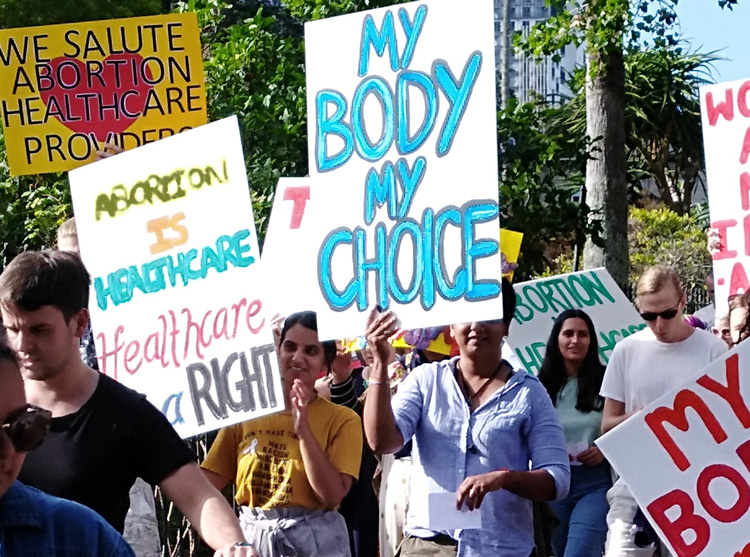AUCKLAND, New Zealand — “I am a young person who doesn’t believe abortion should be in the Crimes Act,” high school student Lucy Mackenzie told the crowd as she kicked off a rally here Feb. 18 demanding a woman’s right to choose.

Before the rally, Mackenzie and fellow high school student Holly Wakelin led a march through the city center with a large banner, “My body, my choice.” Some 250 people, a majority young women, joined the action, chanting, “Whose bodies, our bodies. Whose choice, our choice,” and “Abortion is not a crime. Now, now, now is the time.” Similar protests took place in other cities, part of a National Day of Action.
Young women have taken the lead in organizing campaigns in support of their right to choose to have an abortion. Over the past few years there have been actions in Ireland, South Korea, Argentina and elsewhere, with some mobilizations bringing hundreds of thousands into the streets. In Ireland, a sustained campaign scored a victory in 2019 when the government legalized abortion for the first time.
Legislation before Parliament in New Zealand would remove abortion from the Crimes Act, and change the law to allow a woman to choose to have the procedure in the first 20 weeks of pregnancy. After this she must get the approval of a medical practitioner. The legislation passed its first vote by a wide margin last August. To become law it has to go through two further votes.
‘End stigma around abortion’
“We need this to happen to end the stigma around abortion,” Mackenzie told fellow marchers. “Girls need choices, not judgment.”
Wakelin was the second speaker at the rally. Under the existing law, she said, women “have to pretend we are mentally unstable to get a legal abortion.” High school age women often can’t get them at all, she said, because they are reliant on their parents.
The 1977 law currently in effect says abortion is illegal. But mass protests forced authorities to loosen its application, permit many abortions, and allow clinics to perform them. But women must get the approval of two certifying medical consultants on the grounds that an abortion is needed to prevent danger to their physical or mental health. Under this law, some 30 percent of women in New Zealand have had an abortion during their lifetime.
“Ninety-eight percent of abortions in New Zealand are currently granted on mental health grounds. Putting abortion in the Crimes Act says women are not capable of making our own decisions,” Ella Shepherd, chairwoman of the Auckland University Campus Feminist Collective, told the rally. “It’s not enough just to remove abortion from the Crimes Act, it also has to be available and accessible.”
Restrictions must be removed
Many public hospitals, especially outside the big cities, don’t provide abortions. Due to restrictions in the law and difficulties in arranging to have the procedure, many women often find themselves having to wait weeks to get an abortion. As a consequence, 80% of abortions performed today are invasive surgical procedures. If the obstacles are cleared away, many more can be induced with a pill.
“This is my second protest,” Barbora Sharrock told the Militant. “The first was ‘Schools Strike for Climate.’ Abortion is more controversial, but has always been an important issue to me.”
Four high school students from Rosehill College came as part of a joint project for their social studies class — to do a report on why abortion should be legal. “We welcome the decriminalization of abortion, something women have long been fighting for,” Annalucia Vermunt, who was the Communist League candidate for mayor of Auckland in 2019, told them.
“The Communist League stands for women’s right to unrestricted access to family planning services, including the right to safe, secure abortions and government-funded child care,” she said. “We oppose the state intervening in a woman’s right to control her own body and reject any restrictions on access to abortion under the new law.”


